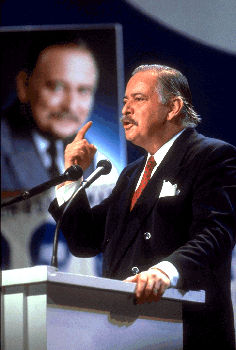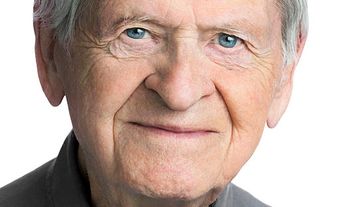Education and Early Career
Bernard Landry attended the Académie Saint-Louis in Saint-Jacques, Québec, and the Séminaire de Joliette before pursuing law at the Université de Montréal. He also completed a degree in economics and finance at the Institut d’études politiques in Paris. Admitted to the Québec Bar in 1965, he underwent further training at the Ministère des Finances et des Affaires économiques in Paris, France from 1965 to 1967. He then practised law in Joliette and Montréal from 1969 to 1976.
Landry's interest in Québec politics and subsequent political career began during his years of post-secondary study. In 1964, he was one of the founding members of the Union générale des étudiants du Québec (UGEQ), the province’s first student federation. Subsequently and until 1968, he was the technical adviser at the office of the minister of natural resources, co-ordinator for Québec on the Canadian Council of Resource Ministers and chargé de mission at the office of the minister of education. Landry was the Parti Québécois candidate in Joliette in 1970. That first candidacy ended in defeat, as did his second, in Joliette-Montcalm in 1973.
Member of National Assembly and Minister
Landry was elected member of the National Assembly (MNA) for the first time on 15 November 1976, in the riding of Fabre, when the Parti Québécois (PQ) came to power for the first time. In 1977, he was appointed minister of state for economic development in René Lévesque's Cabinet, a position he held until the 1981 election. Landry was re-elected MNA on 13 April 1981, this time in the Laval-des-Rapides riding. During that second mandate, Premier Lévesque entrusted him successively with a number of ministerial responsibilities. He was appointed minister of state for economic development in April 1981, then, in September 1982, he was named minister for external trade. From 1984 to 1985, he served as minister of international relations and, from 16 October to 12 December 1985, he served as minister of finance in the Cabinet of the newly elected premier Pierre Marc Johnson. Unlike several members of the caucus, Landry remained loyal to Lévesque despite the latter’s “beau risque” strategy for negotiating a reform of Canadian federalism with the newly elected government of Brian Mulroney (see Sovereignty-Association).

In the general election of 12 December 1985, the PQ was relegated to the rank of Official Opposition in the National Assembly. Landry was not re-elected in his riding. From 1986 to 1994, he devoted himself to teaching, as an associate professor at the School of Management of the Université du Québec à Montréal (UQAM). Having widely recognized expertise in economics and finance, Landry was invited to teach in France, Mexico and Africa. From 1986 to 1987, he co-hosted Le Monde magazine, a public affairs program on television. In 1987, his book Commerce sans frontières : le sens du libre-échange was published by Québec Amérique.

On 12 September 1994, the PQ returned to power. Landry was vice-chairman of the PQ from 1989 to 1994, when he decided to run in the Verchères riding. He won the seat and was appointed deputy premier. During that mandate, Landry held numerous Cabinet portfolios. The first year, under Jacques Parizeau, he held several positions: minister of international affairs, immigration and cultural communities; minister responsible for the Francophonie; minister responsible for the Secrétariat à la jeunesse; minister responsible for the Secrétariat à l'action humanitaire internationale; and member of both the Committee on Priorities and the Committee on Legislation.
On 31 October 1995, after the referendum on Québec sovereignty, Premier Jacques Parizeau resigned and Lucien Bouchard succeeded him. Landry remained deputy premier and was also appointed minister of industry, trade, science and technology; minister of state for the economy and finance; minister of finance and minister of revenue; chairman of the Comité ministériel de l’emploi et du développement économique; and minister responsible for the Estrie region.
Re-elected in Verchères in the general election of November 1998, Landry remained deputy premier. He was also assigned the duties of minister of state for the economy and finance, minister of industry and trade, minister of finance, minister responsible for the Estrie region and chairman of the Comité ministériel de l’emploi et du développement économique. He was also named minister of revenue and chairman of the Comité ministériel spécial de la région de la Gaspésie-Îles-de-la-Madeleine in 1999. That same year, Landry succeeded in eliminating Québec’s budgetary deficit (commonly known as “zero deficit”), which allowed the Bouchard government to announce significant tax cuts.
Premier of Québec
At a press conference on 11 January 2001, Lucien Bouchard announced that he was resigning as leader of the Parti Québécois and would step down as premier of Québec as soon as his successor had been chosen. Landry became party leader on [NB1] March 2001, and was appointed and sworn in as the premier of Québec on 8 March. During his administration, he made Québec’s economic development a top priority and signed the Agreement Respecting a New Relationship Between the Cree Nation and the Government of Quebec, commonly known as the “Paix des Braves.” This agreement with the Grand Chief of the Grand Council of the Crees concerned resource development in Northern Québec. However, by 2002, public opinion polls showed a significant decline in the PQ’s popularity (from 46 per cent to 41 per cent in two months). Voters’ intentions favoured Jean Charest’s Liberal Party (46 per cent) and Mario Dumont’s Action Démocratique du Québec (20 per cent).
In the general election of 2003, Landry's PQ was defeated by the Liberals. His struggles on the campaign trail and ultimate defeat were the subject of an award-winning documentary film directed by Jean-Claude Labrecque, À Hauteur d’homme. Landry remained as the leader of the PQ, the official opposition in the National Assembly, until 2005. Although he had planned to lead the party to victory in Québec and hold another referendum in the province within five years, Landry resigned in June after gaining only 76.2 per cent approval in a leadership confidence vote at the June 2005 PQ convention. He was succeeded by Louise Harel as interim leader until André Boisclair was elected to the position on 15 November 2005.

In September 2005, Landry returned to university-level teaching as a professor with UQAM’s School of Management and as an associate fellow of the Raoul-Dandurand Chair of Strategic and Diplomatic Studies. In November of that year, he joined the law firm Lapointe Rosenstein (now Lapointe Rosenstein Marchand Melançon, L.L.P.) as a strategic adviser. Bernard Landry continues to appear regularly in the media as a commentator on political and economic news.
Awards
Bavarian Order of Merit (1999)
Grand-croix of the Ordre de la Pléiade, Assemblée des parlementaires de la Francophonie (2002)
Commandeur of the Légion d’honneur, Government of France (2004)
Prix Louis-Joseph-Papineau, Rassemblement pour un pays souverain (2005)
Patriot of the Year, Société Saint-Jean-Baptiste de Montréal (2006)
Grand Officer of the National Order of Québec (2008)
Prix Pierre-Bourgault, Mouvement souverainiste du Québec (2008)
Medal of the Université du Québec à Montréal (2014)

 Share on Facebook
Share on Facebook Share on X
Share on X Share by Email
Share by Email Share on Google Classroom
Share on Google Classroom




